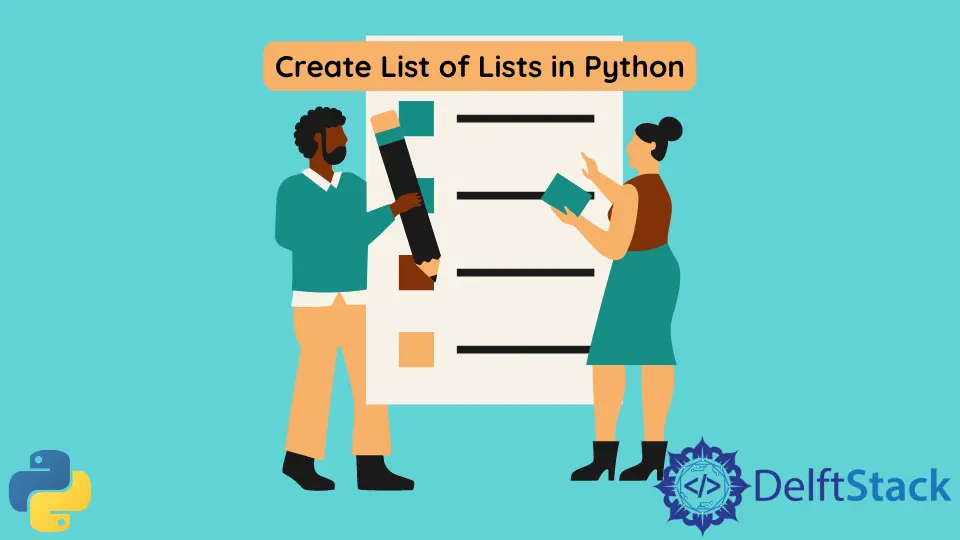How to Create List of Lists in Python
- Method 1: Using List Comprehension
- Method 2: Using Nested Loops
-
Method 3: Using the
append()Method -
Method 4: Using the
*Operator - Conclusion
- FAQ

Creating a list of lists in Python is a fundamental skill that can enhance your programming capabilities significantly. Whether you’re dealing with matrices, nested data structures, or simply organizing related data, understanding how to create and manipulate lists of lists will serve you well.
In this tutorial, we will explore different methods to create a list containing other lists in Python. We will provide clear examples and detailed explanations to help you grasp the concept thoroughly. By the end of this article, you’ll have a solid understanding of how to work with nested lists in Python, allowing you to apply this knowledge to various programming scenarios.
Method 1: Using List Comprehension
One of the most efficient ways to create a list of lists in Python is by using list comprehension. This method allows you to generate a new list by applying an expression to each item in an existing iterable, making your code concise and readable.
Here’s how you can create a list of lists using list comprehension:
rows, cols = 3, 4
list_of_lists = [[0 for _ in range(cols)] for _ in range(rows)]
Output:
[[0, 0, 0, 0], [0, 0, 0, 0], [0, 0, 0, 0]]
In this example, we define the number of rows and columns. The outer list comprehension creates a list of lists, while the inner list comprehension fills each sublist with zeros. This method is particularly useful when you need to initialize a grid or a matrix. List comprehension is not only concise but also efficient, making it a preferred choice for many Python developers.
Method 2: Using Nested Loops
Another straightforward way to create a list of lists is by using nested loops. This method is intuitive and easy to understand, especially for beginners. It allows you to build each sublist iteratively.
Here’s an example using nested loops:
rows, cols = 3, 4
list_of_lists = []
for i in range(rows):
sublist = []
for j in range(cols):
sublist.append(0)
list_of_lists.append(sublist)
Output:
[[0, 0, 0, 0], [0, 0, 0, 0], [0, 0, 0, 0]]
In this code snippet, we first initialize an empty list called list_of_lists. We then use a nested loop to create each sublist. The outer loop iterates over the number of rows, while the inner loop appends zeros to the sublist. Once the sublist is complete, we append it to the main list. This method provides a clear and structured approach to creating lists of lists, making it easy to customize the elements in each sublist.
Method 3: Using the append() Method
You can also create a list of lists by utilizing the append() method. This technique is particularly useful when you want to build your list dynamically, adding elements as needed.
Here’s how you can implement this method:
rows, cols = 3, 4
list_of_lists = []
for i in range(rows):
list_of_lists.append([0] * cols)
Output:
[[0, 0, 0, 0], [0, 0, 0, 0], [0, 0, 0, 0]]
In this example, we start with an empty list called list_of_lists. The append() method is used to add new sublists, which are created by multiplying a list containing a single zero by the number of columns. This method is both efficient and straightforward, allowing for easy modifications to the structure of the list. If you need to adjust the values in your sublists later on, this approach provides a flexible foundation for doing so.
Method 4: Using the * Operator
The * operator can also be used to create a list of lists in Python. This method is particularly handy when you want to create a list with identical sublists without using loops.
Here’s an example:
rows, cols = 3, 4
list_of_lists = [[0] * cols] * rows
Output:
[[0, 0, 0, 0], [0, 0, 0, 0], [0, 0, 0, 0]]
In this approach, we create a single sublist filled with zeros and then replicate it across the specified number of rows. However, be cautious with this method, as modifying one sublist will affect all others since they reference the same list in memory. This technique is useful for quickly initializing a list of lists, but it’s important to understand its limitations.
Conclusion
Creating a list of lists in Python is an essential skill that opens up a world of possibilities for data organization and manipulation. In this tutorial, we explored four different methods: using list comprehension, nested loops, the append() method, and the * operator. Each method has its advantages and is suitable for different scenarios. Whether you’re initializing a grid for a game, managing nested data structures, or simply organizing related information, understanding how to work with lists of lists will enhance your programming toolkit. As you practice these techniques, you’ll find that they become second nature, allowing you to write more efficient and effective Python code.
FAQ
-
What is a list of lists in Python?
A list of lists is a data structure that contains multiple lists as its elements, allowing for the organization of related data in a nested format. -
How do I access elements in a list of lists?
You can access elements in a list of lists using multiple indices. For example,list_of_lists[row_index][col_index]retrieves the element at the specified row and column. -
Can I create a list of lists with different lengths?
Yes, each sublist in a list of lists can have different lengths. You can append or modify sublists independently. -
What are some practical uses of a list of lists?
Lists of lists are commonly used to represent matrices, grids, or any hierarchical data structure, making them useful in various programming scenarios. -
Is there a limit to how many lists I can nest?
Python does not impose a strict limit on the number of lists you can nest, but deep nesting may lead to complicated code and performance issues.
Manav is a IT Professional who has a lot of experience as a core developer in many live projects. He is an avid learner who enjoys learning new things and sharing his findings whenever possible.
LinkedInRelated Article - Python List
- How to Convert a Dictionary to a List in Python
- How to Remove All the Occurrences of an Element From a List in Python
- How to Remove Duplicates From List in Python
- How to Get the Average of a List in Python
- What Is the Difference Between List Methods Append and Extend
- How to Convert a List to String in Python
